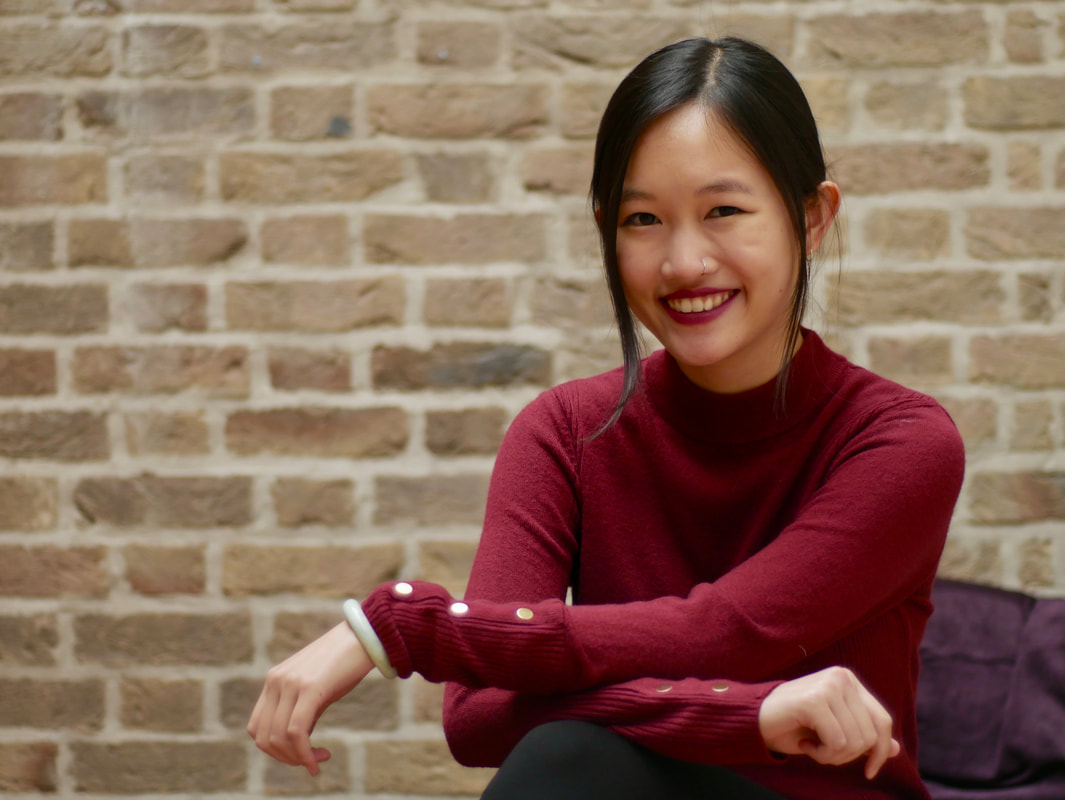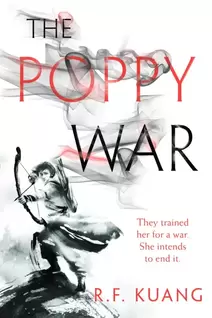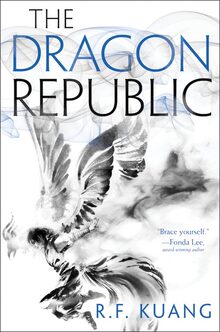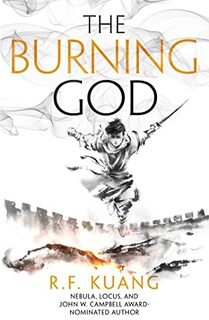Interview with Rebecca Kuang
R.F. Kuang, Ana Chen
R.F. Kuang, Ana Chen
|
It would be no exaggeration to call Rebecca Kuang, or R.F. Kuang, both a rising star and a crowned queen of fantasy. Having published The Poppy War trilogy in 2018, Ms. Kuang proceeded to win the Crawford Fantasy Award, the Compton Crook Award, and the Hugo Astounding Award for Best New Writer. Her writing is known for its unflinching portrayal of Chinese history, through which she explores the horrors of war and colonialism. Originally from Guangzhou, China, Ms. Kuang is a graduate of Georgetown University and the Marshall Scholarship program, and is an incoming Ph.D. student at Yale University. I recently had the honor of interviewing her for It’s Real.
|
A.C.: As an Asian-American, I've found that reading Asian-American literature can be both cathartic and painful. The same is true to varying degrees whenever I write pieces centered on my Asian identity. I understand that writing about subjects such as the Rape of Nanjing and the century of humiliation must have been extremely taxing, yet one of the biggest reasons I admire The Poppy War is your unflinching portrayal of war's horrors. Was the process of writing The Poppy War also a process of healing? Why or why not?
R.K.: Actually, it wasn't remotely healing. The Poppy War is a revenge fantasy, and I'm no longer sure what revenge gets us. I should caution here that I wrote The Poppy War before my junior year of undergrad, just before I switched my major to history, and far before I'd gained a more in-depth understanding of Chinese history, Sino-Japanese relations, and the way that war trauma has been politicized and commemorated by the PRC. When I came up with that ending, I'd just found out about the Nanjing Massacre, I'd just finished Iris Chang's book, and I was writing from a place of rage and fury that the Western world didn't seem to care about that pain. Two masters degrees in Chinese studies later, I have a much more nuanced understanding of collective trauma and memory. I don't know how valuable it is to hold on to that anger anymore, particularly when that anger can be so easily coopted by state interests. I've thought more about cycles of dehumanization and otherization, and I think that's reflected in the way I chose to end The Burning God. I still wouldn't change the ending of The Poppy War, because I think it was important to show Rin at that place in her journey. But the trilogy as a whole shows an evolution of thought and, I hope, maturity.
A.C.: In one of your previous interviews, you addressed how The Poppy War trilogy faced criticism for not being "Asian" or "American" enough for respectively "Asian" or "American" readers. Gatekeeping within the Asian-American literary world is a real and sometimes harmful phenomenon, as evidenced by the backlash Maxine Hong Kingston received from the more literary Asian-American writers of Aiiieeeee! or in the shunning of Cynthia Kadohata, who had chosen not to write about Japanese internment in the year directly after World War II. Given the dearth of marginalized voices in the literary world, it is commonly believed that a marginalized writer bears a political responsibility to their community. What do you make of this responsibility? Did you ever experience backlash from the Asian-American community, whether for the subjects you addressed or the manner in which you addressed them?
R.K.: First, I think it’s wild to imply that Maxine Hong Kingston’s work is not “literary.”
Second, I don’t know that “gatekeeping” is the right word. Gatekeeping implies that some people control access to opportunities and success, which is not necessarily the case for Asians in publishing. I think what you’re actually describing is inter-community debates among different factions - new immigrants, recent immigrants, diaspora members from different countries and ethnicities, men, women, etc. etc. – about what proper “Asian” representation should look like. Your Chinese American experience is not my Chinese American experience. And it’s unfortunate that we so often buy into the monolithic paradigm assigned to us by the white gaze and mistakenly assume that we are the same. I think that’s where much of this authenticity testing comes from–if you don't describe a New Year's feast the way I experienced it, if you don't wrap dumplings exactly the way I wrap them, then you must be a fake Chinese American. So goes the logic. (Which of course ignores that China itself is a place of such vast cultural diversity that its provinces may as well be different countries!) But as Lisa Lowe reminds us, “we can afford to rethink the notion of ethnic identity in terms of cultural, class, and gender differences, rather than presuming similarities and making the erasure of particularity the basis of unity.” No white writers are presumed to speak for their entire white community when they publish stories about specific experiences. We tend to judge our creatives more when it comes to sociopolitical representation, largely because there are so few of us who break out to the mainstream. But I hope we reach a point where a Chinese American writer writing a YA novel about a girl at art school, for example, is not expected to “authentically represent” all Chinese Americans, all artists, or all diaspora teens, but rather just telling a story that she finds meaningful.
Curiously, I have gotten backlash from Chinese readers claiming that The Poppy War doesn't read as Chinese enough. I've seen people say that it reads as too Westernized, both in dialogue and in aesthetics. I think what they mean is that it doesn't read like a wuxia novel. It doesn't look or sound like a C-drama or a martial arts film, which I think are the dominant archetype of Chinese fantasy. But there are many different ways of engaging with Chinese culture and Chinese history. I chose to engage on a thematic level. That works for some people; others will just be continuously bothered that it doesn't read like a Jin Yong novel. That's fine.
A.C.: What is your favorite Chinese food?
R.K.: You can’t really expect me to answer with just one! The dish I make most often is fanqiedan (番茄蛋), or literally “tomato-egg.” It’s so quick, cheap, easy to make, and delicious. Definitely a staple of my undergraduate days.
If I could eat any dish to order, though, it would be my mom’s sweet mung bean stew (绿豆沙.) I used to ask for ice cream when I was little, but my mom would feed me mung bean stew instead and say it was “Chinese ice cream.” And I believed her, like a dummy. Chinese desserts are super flexible, so I like it with taro, ximilu, red bean, grass jelly, ice cubes, pearl barley, or just by itself. It’s so good.
A.C.: One of the most prevalent themes of The Poppy War is trauma. In many fields of study (and in literature), trauma is often approached through an intergenerational or collective lens. Healing, on the other hand, is frequently considered an individual phenomenon. Do you think there is such a thing as collective or intergenerational healing - and if so, how would it differ from individual healing? And what role does storytelling play in healing, whether collective or individual?
R.K.: There's actually quite a lot of scholarship on collective healing and how storytelling is critical to the process! I don't think anyone imagines community-wide conflicts can be resolved on a purely individual level. I took a wonderful class my senior year on violent conflicts, peace, and the arts, and we talked about how things like community theater, radio dramas, poetry, and yes, novels have accomplished so much in facilitating reconciliation between factions. John Paul Lederach's The Moral Imagination was eye opening on this topic.
A.C.: Imposter syndrome is common in the (often lonely) writing world, especially among young writers of color. What tips do you have for dealing with imposter syndrome, and for navigating the world of publishing?
R.K.: Imposter syndrome isn’t something I struggle with when I’m writing–writing already takes such an idiotic leap of faith to begin with–but it’s definitely something I’ve had to overcome on the business side of publishing. I don't know if I've completely figured it out. I always feel surprised when I ask for more publisher support for things like events or swag and I actually get it. I've gotten more sure of myself in business meetings, but that might just be a consequence of getting older. It's so different talking to your publisher when you're 24 instead of 19.
I guess I'd say the crucial thing is to remember you're the talent. You're the creator; you're the one whose words are making money. Be polite and professional, but don't be scared to ask for more. The worst thing that'll happen is that you don't get it. But no one's going to fire you out of the blue for asking your worth.
A.C.: You've described yourself as an "ideas" author in your previous interviews - which is so admirable! (I'm a very very character-based author, so I always struggle with themes and ideas in my stories.) You've also described your next project, a standalone novel based in Oxford, as an exploration of colonialism in academia. What other ideas are you considering or looking forward to tackling?
R.K.: I have a hard time talking about story ideas until they've fully taken root and a draft is underway. They're fragile embryos, and I don't like making promises I can't keep. I'll talk more about the Oxford novel, though. It's not just about colonialism in academia, although the exploitative foundations of the academy are something that I think rarely gets discussed in dark academia. It's also about complicity and responsibility. What do you do when you're a scholarship student at a classist, sexist, and racist institution? Do you just take what's handed to you? Do you just sip the champagne? These are questions that bothered me the entire time I was at Oxford and Cambridge, and which I'm still seeking the answers to.
A.C.: In previous interviews, you’ve addressed how important mentorship and solidarity are among writers of color. Fantasy written by Asian-American writers is absolutely incredible. Which other Asian-American writers would you recommend, and which Asian-American writers do you look to for inspiration?
R.K.: It sure is! For more Asian American fantasy writers, look to Ken Liu, Alyssa Wong, and Fonda Lee. I've admired them all since I started in the industry, and they've been really generous mentors.
Right now, though, I’m actually not reading a lot of fantasy. It might be a symptom of just having finished this trilogy, but I’m getting a little tired with the genre and what it can do. I’d like to stretch my muscles and explore surrealism, magical realism, and alternative history. Most recently, I’ve been reading work by Catherine Chung, Susie Yang, Charles Yu, Alexander Chee, and Esme Weijun Wang. Catherine Chung's The Tenth Muse in particular is a recent, and much admired find.
|
On behalf of It’s Real, we would like to thank Ms. Kuang for her time and words! If you would like to read more from her, check out the award-winning The Poppy War trilogy, or find her at https://rfkuang.com/.
|




